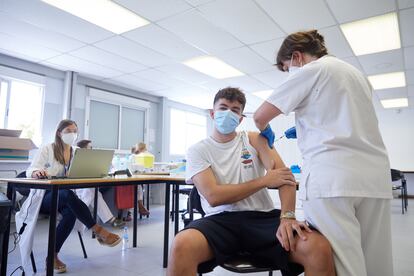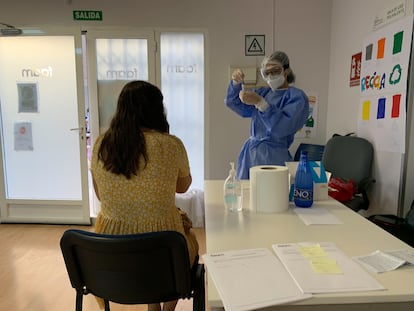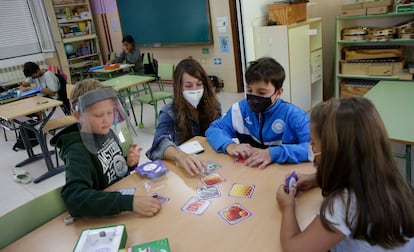Do I have to quarantine after contact with a coronavirus case? Will a tracer call me? All the rules in the ‘new normality’
Experts are calling on the Spanish public not to drop their guard despite the improving data. While more of the population is vaccinated, there is still risk of contagion


Spain is once again approaching the so-called new normality. The country has entered a new work and school year with most of the population vaccinated against Covid-19 and coronavirus cases on a downward trend. There will continue to be new infections, outbreaks and quarantines, but the rules of the game have changed. While basic protective measures such as the use of face masks, social distancing and hand washing remain in place, the rules concerning when vaccinated close contacts must self-isolate have become more flexible. This means that there will be a considerable drop in the number of close contacts who have to quarantine, as nearly 75% of the population in Spain is fully vaccinated.
Given the high vaccination coverage and the fact that the 14-day cumulative number of cases per 100,000 inhabitants has now dropped to 109, experts believe the likelihood of Spain seeing a new coronavirus wave as serious as the previous ones is very low. But that doesn’t mean the country should lower its guard, says Salvador Peiró, an epidemiologist from the Valencian government’s Foundation to Promote Health and Biomedical Research. “We are at a moment of uncertainty, we don’t know how transmission will progress. We are expecting an uptick at the end of the month, but we are hoping that it will be less serious with respect to how much damage it causes. Vaccination has not stopped being important when it comes to transmission, so we will have to guide ourselves by the data and take action.”

Vaccination protects a person from developing a serious case of Covid-19 and helps limit the spread of the virus. But it does not prevent a person from contracting the disease: an individual can be fully vaccinated and still get infected. Spanish Health Minister Carolina Darias said in July that 5.5% of positive cases detected in the previous five weeks had the full protection offered by the vaccines. Daniel López-Acuña, a former director of emergencies at the World Health Organization (WHO), believes that the population must remain on alert, despite the high vaccination rates, and says that containing the pandemic will move toward “proper control of outbreaks.”
In the last few months, changes have been made to how the pandemic is controlled, and the new school and work year began in September with a very different framework to the one last year. Here is a guide to the measures in place to control the spread of the coronavirus if a positive case is detected.
Positive cases at work or in public. If a person tests positive for Covid-19, they will have to self-isolate for at least 10 days. This rule has not changed. What has changed are the rules over close contacts of positive cases. While close contacts had to also quarantine for 10 days during most of the pandemic, as of last June this now only applies to unvaccinated people. Close contacts who are fully vaccinated or who have overcome the disease in the past six months do not have to self-isolate, although the Health Ministry recommends that they get tested at least once in the following days.
With the large majority of the population completely immunized, this measure will mean there are significantly fewer quarantines among close contacts. Experts, however, are concerned about the move and insist that vaccinated close contacts must still be very cautious. “I have a lot of doubts about this measure. I feel the same way about all the measures that are different for those who are vaccinated. I think it is tricky because we know that the vaccinated can get infected,” says Salvador Peiró, who adds that contacts must still be watched closely even if they test negative. Experts also recommend that those exempted from quarantining limit their social interaction for some days as a preventive measure.
Positive cases at school. As was the case in the previous school year, if a student tests positive for Covid-19, they must self-isolate for at least 10 days. If it is a suspected case – i.e. the student has compatible symptoms and is waiting to be tested – they are not allowed to attend class until they receive a negative test result. As is the rule for the general population, close contacts of positive cases will have to quarantine for 10 days, unless they are vaccinated or have recovered from Covid-19 in the last six months. In this school year, a student will not have to self-isolate if they meet either of these conditions, although they will have to take two tests – one at the beginning of the quarantine and another a week after their last contact with the confirmed case, according to Health Ministry protocols.
The regions, which are in charge of the vaccination drive and containing the pandemic in their territories, have some margin to act within these protocols. Catalonia, for example, on Tuesday approved a decree that gives Covid officials at high schools access to information on which students are fully vaccinated and which are not, in order to manage class quarantines if a positive case is detected. This does not apply to primary schools as no Covid-19 vaccine has been approved for the under-12s. The Basque Country and Valencia, in contrast, do not make vaccination information available to schools.

Face masks. Since June, it has only been mandatory to wear a face mask in enclosed spaces – the covering can be removed outdoors if a social distance of 1.5 meters can be maintained. Up until that month, it had been mandatory to wear a face mask in both indoor and outdoor public spaces. In schools, the coverings remain mandatory for students over the age of six, although Health Ministry protocols indicate that they may be removed during certain activities outdoors. In Catalonia, for example, students can take off their face mask during recess, if they are only with members of their class bubble.
López-Acuña says that information on the benefits of the preventive measure should be strengthened so that no one lowers their guard. “It is important not to spread a false sense of security,” he explains.
Trackers. If a suspected coronavirus case is detected, epidemiological monitoring services work to track down possible close contacts. “Anyone who is identified as a close contact must be informed and an active or passive monitoring will begin, following the protocols established in each region,” the Health Ministry protocol reads.
Experts say that tracking will be “fundamental” to keeping the pandemic under control. “We cannot relax the measures of epidemiological monitoring, tracking and diagnostic tests if we want to contain the pandemic. Containment will be achieved now with the proper control of outbreaks and track-and-tracers are important for stopping transmission.”
Outbreaks. Any group of three or more active cases in which an epidemiological link has been established is considered an outbreak. Experts warn that such episodes will continue to be detected in the workplaces and in schools, given a large percentage of students are unvaccinated.
For more localized outbreaks, experts recommend mass testing be used as a tool for early detection. Peiró, however, warns this strategy “only makes sense in concrete cases associated with specific outbreaks,” when there is high prevalence of the coronavirus among a certain group and the probability of finding asymptomatic cases is very high.
English version by Melissa Kitson.
Tu suscripción se está usando en otro dispositivo
¿Quieres añadir otro usuario a tu suscripción?
Si continúas leyendo en este dispositivo, no se podrá leer en el otro.
FlechaTu suscripción se está usando en otro dispositivo y solo puedes acceder a EL PAÍS desde un dispositivo a la vez.
Si quieres compartir tu cuenta, cambia tu suscripción a la modalidad Premium, así podrás añadir otro usuario. Cada uno accederá con su propia cuenta de email, lo que os permitirá personalizar vuestra experiencia en EL PAÍS.
¿Tienes una suscripción de empresa? Accede aquí para contratar más cuentas.
En el caso de no saber quién está usando tu cuenta, te recomendamos cambiar tu contraseña aquí.
Si decides continuar compartiendo tu cuenta, este mensaje se mostrará en tu dispositivo y en el de la otra persona que está usando tu cuenta de forma indefinida, afectando a tu experiencia de lectura. Puedes consultar aquí los términos y condiciones de la suscripción digital.








































